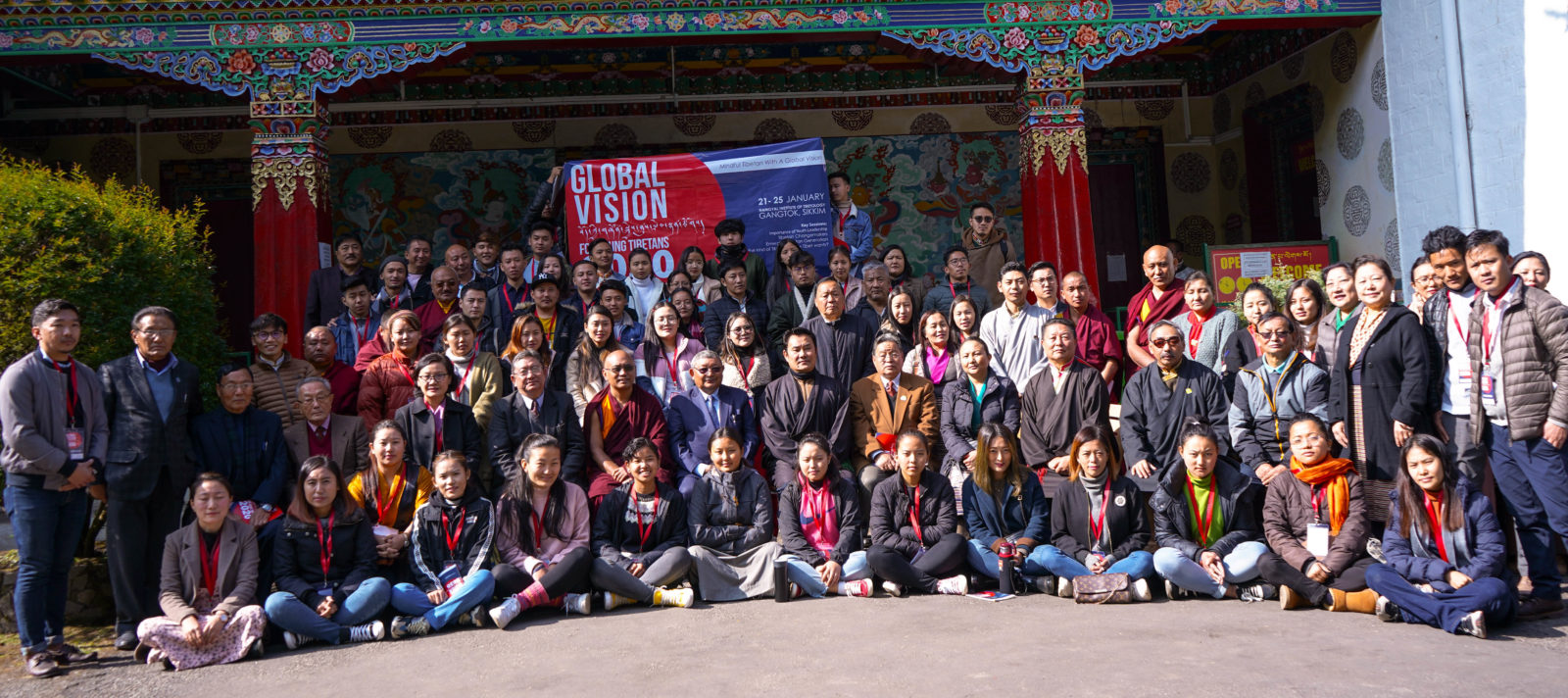 Empowering the Vision Project’s (ENVISION) fifth Global Vision for Young Tibetans Conference (Global Vision 2020 hereafter) was held for the first time in Northeast of India from January 21-25, 2020. The Conference is a biennial but one of the most significant and engrossing events of ENVISION since its inception in 2007.
Empowering the Vision Project’s (ENVISION) fifth Global Vision for Young Tibetans Conference (Global Vision 2020 hereafter) was held for the first time in Northeast of India from January 21-25, 2020. The Conference is a biennial but one of the most significant and engrossing events of ENVISION since its inception in 2007.
Mindful Tibetan with a Global Vision as the guiding motto, the Global Vision 2020 was held at the Namgyal Institute of Tibetology, Gangtok, Sikkim, culturally and historically no less significant and important both for Sikkimese and Tibetans alike, and had fifty-six participants spanning across India; Dharamsala, Delhi, Mysore, Bangalore, Varanasi, Baroda, Kalimpong, Sonada, Darjeeling, Sikkim and Nepal. Taking into consideration the scattered nature of Tibetan communities in Northeast India and the lack of fewer opportunities for the Tibetan Youth thereof in these regions, ENVISION consciously decided to reserve 50 per cent of the seats in the conference for participants of Tibetan origin in Northeast India and Nepal. The other half of the participants were college/university students, young Tibetans professionals and ENVISION beneficiaries.
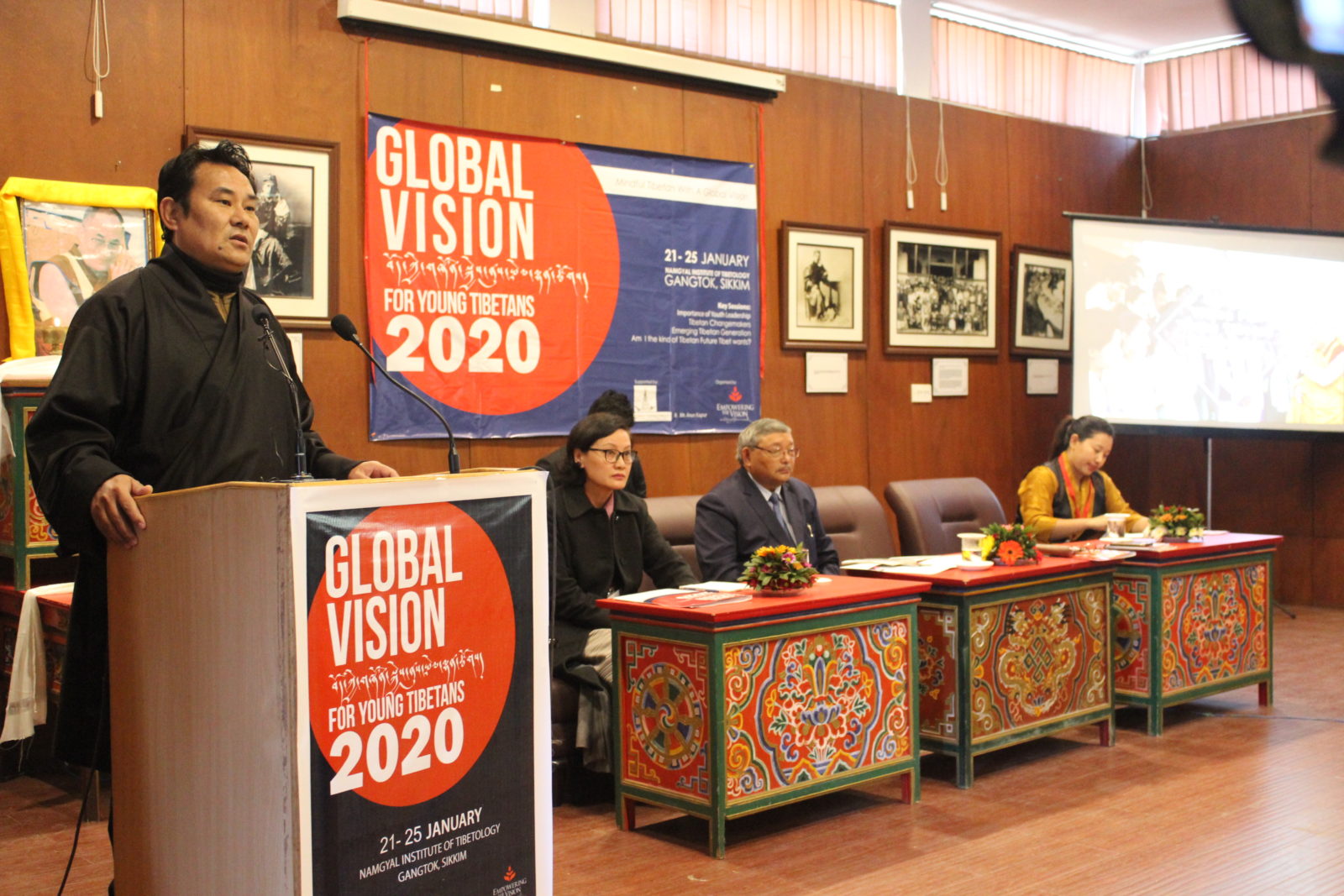 Structured around the themes, Importance of Youth leadership, Tibetan Changemakers, Emerging Tibetan Generation, and Am I the kind of Tibetan Future Tibet wants?, the conference was aimed to recognise and celebrate individuals who are genuinely committed and engaged in the field of education, writing, identity and gender, and also to provide ample space for self-introspection and interaction among participants to share and embrace their role in the community and society at large. Global Vision 2020 is also an attempt by ENVISION to inspire and motivate young Tibetans by facilitating a platform to learn, discuss, and share ideas for self and societal development and to become self-reliant and dynamic members of society.
Structured around the themes, Importance of Youth leadership, Tibetan Changemakers, Emerging Tibetan Generation, and Am I the kind of Tibetan Future Tibet wants?, the conference was aimed to recognise and celebrate individuals who are genuinely committed and engaged in the field of education, writing, identity and gender, and also to provide ample space for self-introspection and interaction among participants to share and embrace their role in the community and society at large. Global Vision 2020 is also an attempt by ENVISION to inspire and motivate young Tibetans by facilitating a platform to learn, discuss, and share ideas for self and societal development and to become self-reliant and dynamic members of society.
The conference began with an informal orientation programme on January 21st in the auditorium of Namgyal Institute of Tibetology. Participants were guided through the nitty-gritty of the days to follow and what are expected out of them and vice-versa. The following day on the 22nd of January, the inaugural session commenced in the presence of the honourable Minister of Human Resource Development, Law, Legislative & Parliamentary Affairs and Land, Revenue and Disaster Management of Sikkim State Government, Kunga Nyima Lepcha as the Chief Guest and Choekyong Wangchuk, Minister of Health of the Central Tibetan Administration as the special guest amongst other dignitaries and local Tibetan community leaders in Gangtok. After lighting the traditional Tibetan Butter lamp in front of a portrait of the Dalai Lama, the special message that His Holiness sent to the participants of the Global Vision 2020 was read out and thus began the official inaugural ceremony.
Special Guest Choekyong Wangchuk spoke on the essence of contributing to the Tibetan movement, recounting his own personal experiences of initiatives and responsibilities that he undertook as a young Tibetan back then and his affirmation to continue in the years to come. He also advocated the Middle Way Approach as the official stand of the Central Tibetan Administration to resolve the Sino-Tibetan conflict. He spoke later in the day on the importance of Youth leadership at a plenary session and reaffirmed his belief in the saying ‘Think Globally, Act locally’ and urged the participants to follow suit.
Chief guest Kunga Nyima Lepcha shared his experiences of working with the Tibetans and how the resilience of Tibetans inspires him on a daily basis. He elucidated the importance of instilling a broad vision for any movement to sustain, survive and succeed. Kunga also emphasised on the role and power of youth and their responsibility to carry forward the legacy of the elder generation of Tibetans. He shared his joy as well as appreciation to ENVISION for organizing the conference at a historical venue such as the Namgyal Institute of Tibetology and for focussing on youth in Northeast India.
A sightseeing tour was added on the agenda of the first day of the conference to familiarise the participants about Sikkim, to get insights on its culture, history and people.
Plenary Sessions: Day Two: Tibetan Changemakers
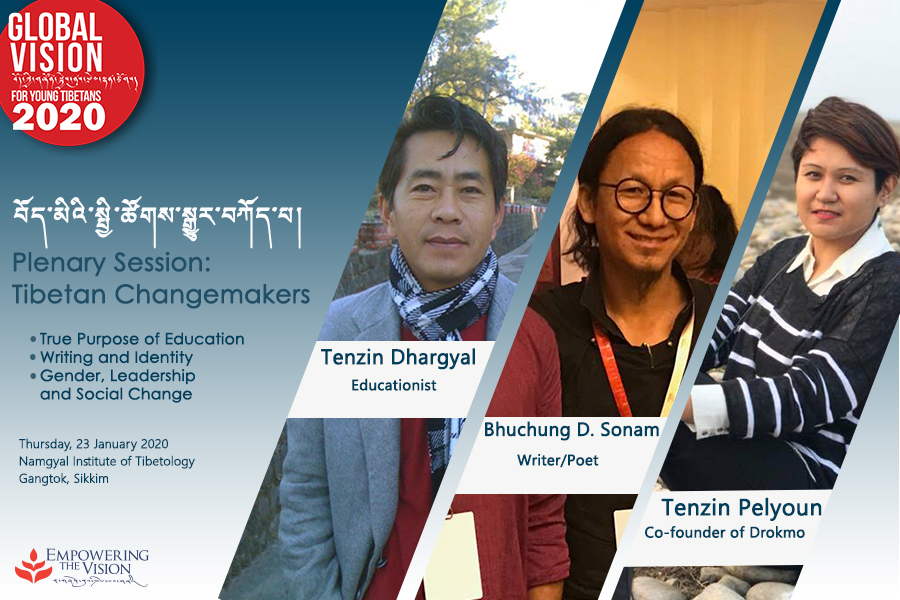
One of the drives of the Global Vision 2020 was to celebrate and recognize the positive changes that some profoundly committed individuals make through their personal and professional engagements in the Tibetan Community.
Changes are generally more constructive and vibrant in the field of education, art and gender sensitisation in any community, and the Tibetan community in exile is no exception. In this regard, ENVISION is happy to have invited Tenzin Dhargyal, a Teacher by profession with over 24 four years of teaching experience in the Tibetan Children’s Village, Bhuchung D Sonam, a well-known Poet and Writer, and Tenzin Pelyoun, Co-Founder of Drokmo, an organization which advocates Gender-Equality in the Tibetan Community to speak respectively on the ‘True Purpose of Education,’ ‘Writing and Identity’ and on ‘Gender, Leadership and Social Change’ on the second day of the Global Vision Conference.
Tenzin Dhargyal, took the first session of the day on the ‘True Purpose of Education’ and began by explaining the etymology of the term ‘education’ in different school of thoughts like idealism, naturalism and pragmatism substantiating these by quoting famous philosophers such as Albert Einstein, Gandhi and the Dalai Lama and their views on the subject. Dhargyal asserted his belief that ‘education is the internship of life’ and one should never stop learning. He also emphasised on the Tibetan definition of education by Thoemi Sambhota, i.e ‘Tho Sam Ghom’ – ‘hear, think and analyse’ and stated that it should be a way of life. Dhargyal then immersed the participants of their understanding of Albert Einstein’s famous saying, ‘ The only thing that interferes with my learning is my education’ and asked their thoughts. Like Einstein, Dhargyal also echoed how rigid education institutions can mitigate the thought process and the minds of students, and that most often these do not encourage holistic approach and critical thinking.
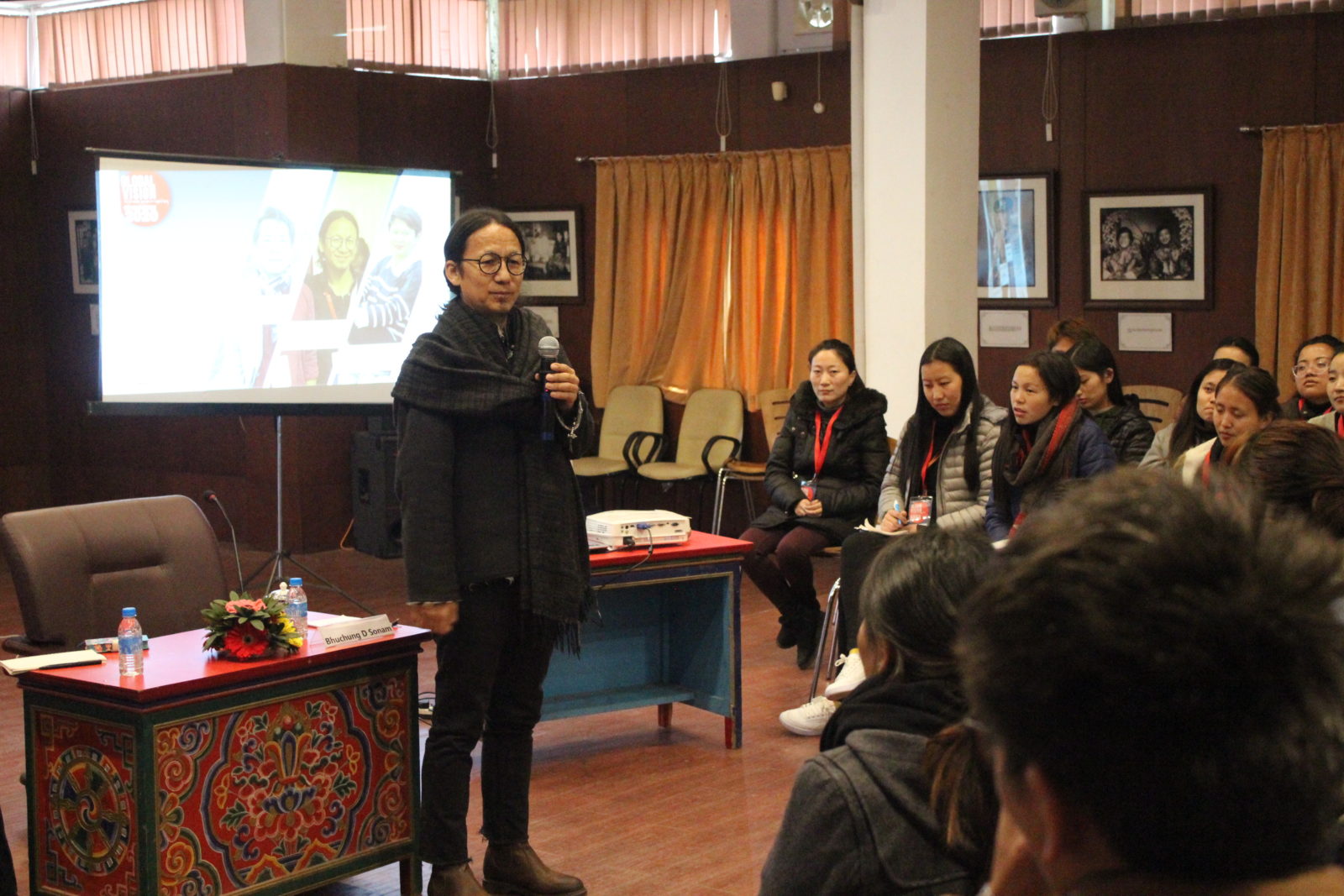 Bhuchung D Sonam, who has published a wide range of books and poetry from, An Anthology of Tibetan Poetry, Yak Horns; Notes on Contemporary Tibetan Writing, Music and Film & Politics to the latest edited volume of ‘Tibetan Self-Immolations 1998-2018, News, Views and Global Response’ cannot be more apt of a speaker to talk on ‘Writing and Identity’ at the conference. Bhuchung shared his Tibetan literary influences such as Milarepa, the sixth Dalai Lama, Dhondrub Gyal, Thuerang, and Chen Metak who he believes immaculately brings forth the pains of living under oppression through their writings and poetry. Bhuchung further indicated through his experiences that ‘pain (Tib: ན་ཟུག་) of any kind can become a strong catalyst for art, poetry and writing’ and that exploring self-and identifying both personal and collective adversities such as pain, frustration, struggles and displacement can become a positive incentive to writing and creativity. Questions ranging from Tibetan national identity, insights on Gendun Choephel’s works, correlation between writing and identity, the definition of a ‘Tibetan’ and importance of language to maintain cultural identity were raised by the participants to Bhuchung, who apart from the session also took ‘Writing Workshops’ for the participants in the evenings.
Bhuchung D Sonam, who has published a wide range of books and poetry from, An Anthology of Tibetan Poetry, Yak Horns; Notes on Contemporary Tibetan Writing, Music and Film & Politics to the latest edited volume of ‘Tibetan Self-Immolations 1998-2018, News, Views and Global Response’ cannot be more apt of a speaker to talk on ‘Writing and Identity’ at the conference. Bhuchung shared his Tibetan literary influences such as Milarepa, the sixth Dalai Lama, Dhondrub Gyal, Thuerang, and Chen Metak who he believes immaculately brings forth the pains of living under oppression through their writings and poetry. Bhuchung further indicated through his experiences that ‘pain (Tib: ན་ཟུག་) of any kind can become a strong catalyst for art, poetry and writing’ and that exploring self-and identifying both personal and collective adversities such as pain, frustration, struggles and displacement can become a positive incentive to writing and creativity. Questions ranging from Tibetan national identity, insights on Gendun Choephel’s works, correlation between writing and identity, the definition of a ‘Tibetan’ and importance of language to maintain cultural identity were raised by the participants to Bhuchung, who apart from the session also took ‘Writing Workshops’ for the participants in the evenings.
The last session of ‘Tibetan Changemakers’ was undertaken by Tenzin Pelyoun, Co-Founder of Drokmo. Pelyoun spoke on ‘Gender, Leadership and Social Change’ and emphasised that ‘Gender Equality’ does not mean disrespecting rights and opportunities of men as many tend to believe but rather it is about giving equal opportunities, equal treatment before the law and freedom of choice to women as well. Pelyoun highlighted through statistics of the unrepresented and gender-biased power-relations with regard to political and economic decision-making processes in the Tibetan establishment in particular and in the Tibetan society in general. The few women, who have managed to come to power and/or are in power, she said is ‘because of their privileges.’ She also spoke on gender-based violence in the society and created awareness about prevalent, prejudiced and patriarchal predispositions against women even in mundane and basic advertisements such as sanitary pads, condoms, and beauty creams. She reiterated that gender equality is not only a fundamental human right but also a necessary foundation for an equal, prosperous and sustainable world.
Plenary Session: Day Three- Emerging Tibetan Generation I & II 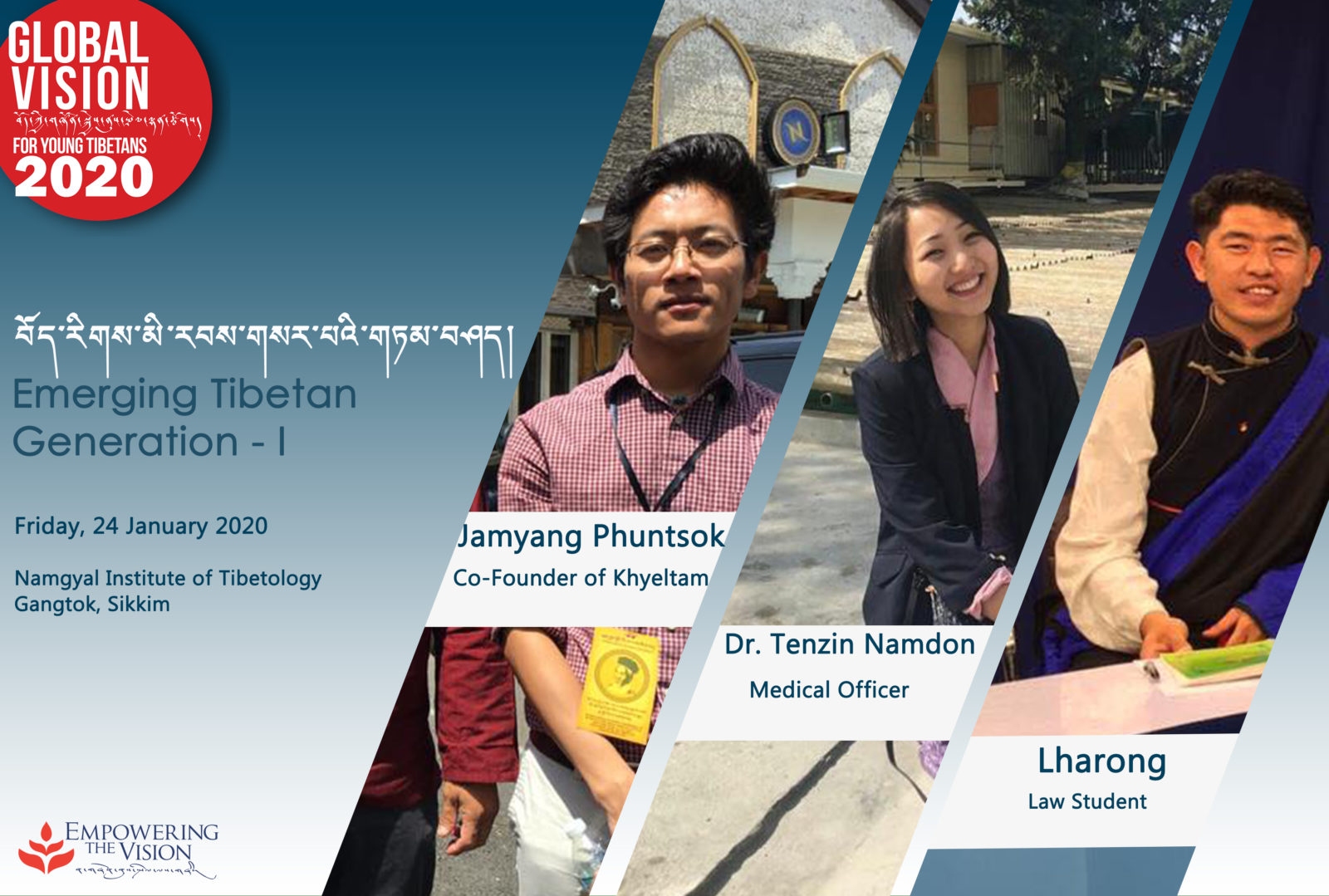
Both the sessions of the Emerging Tibetan Generation was meant to provide a platform for young emerging and visionary Tibetans to share their contributions, ideas and views. This includes past beneficiaries of ENVISION’s programmes.
The first session of the plenary for Emerging Tibetan Generation had Jamyang Phuntsok, Tenzin Namdon and Lharong, three young bright minds in the field of literature, art, law and medicine. As diverse and vibrant as their field of study and occupation are, the session was captivating and inspiring.
Jamyang Phuntsok, spoke about his Tibetan language Podcast, Khyeltam, why and how he started it (with a friend), the nature of topics Khyeltam discusses, and the positive response it is getting from various circles of listeners. Jamyang also expressed his innate love for reading history, poetry, literature and shared his conscious effort to read at least one Tibetan literary work a month. He shared excerpts from Dondrub Gyal’s ‘Waterfall of Youth’ and Gendun Choephel’s poem to illustrate how reformist and liberal these Tibetan literary figures were and how rich their literary writings are. Jamyang said Tibetan literary output, in general, is extremely rich and ancient, citing the example of Dunhuang manuscripts of Tibetan poetry found in a desert in Central Asia by English explorers in the early 20th century, similarly Buddhist manuscripts, history, secular poems and literature are extremely rich and worth flaunting, however, he said “it is important to study and understand these rich literary outputs first.”
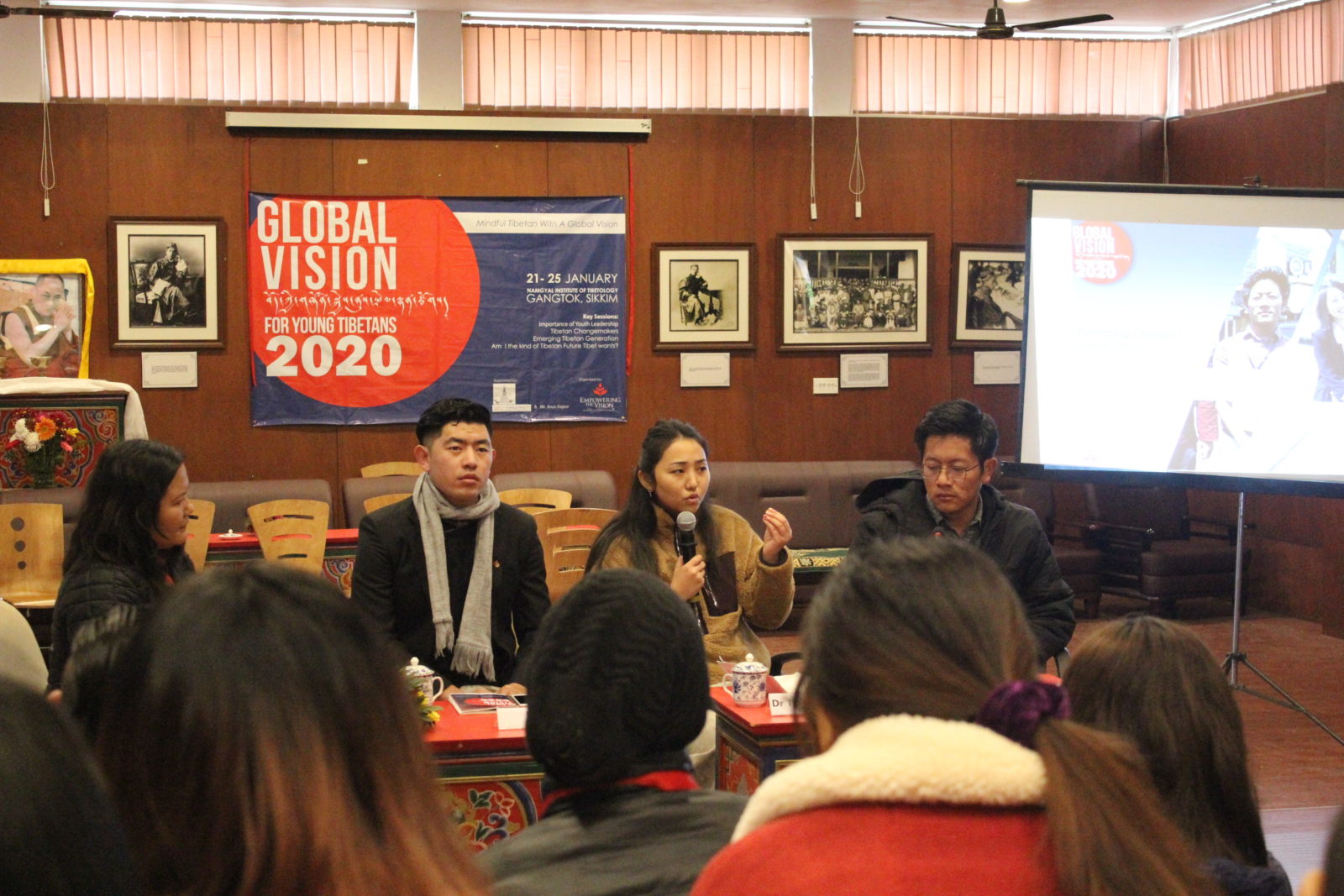 Tenzin Namdon, a Medical Officer at Delek Hospital in Dharamsala shared her personal journey to becoming a doctor at a young age. She explained the struggles, hard work and discipline one needs to have to clear competitive medical exams. She said it was not easy to become a doctor and that she had to sacrifice a lot but in the end, she said: “the hard work was worth it.” Dr. Namdon also spoke about common prevalent ailments amongst Tibetans such as stomach cancer, hepatitis, and how best to prevent them by recognizing the signs and symptoms well in advance.
Tenzin Namdon, a Medical Officer at Delek Hospital in Dharamsala shared her personal journey to becoming a doctor at a young age. She explained the struggles, hard work and discipline one needs to have to clear competitive medical exams. She said it was not easy to become a doctor and that she had to sacrifice a lot but in the end, she said: “the hard work was worth it.” Dr. Namdon also spoke about common prevalent ailments amongst Tibetans such as stomach cancer, hepatitis, and how best to prevent them by recognizing the signs and symptoms well in advance.
Lharong, a law student at IMS Unison University, Dehradun awed the participants through an articulative personal narrative of his life story. He shared his personal struggles, challenges and how he overcame those through resilience, optimism and hard work. Lharong reiterated his faith in the ‘Power of Youth,’ and how individual, collective and professional responsibilities are imperative to sustain and carry forward the Tibetan movement. He cited through his presentation the various initiatives and responsibilities that he undertook starting from his school days. The participants were moved, inspired and charged by his impeccable presentation. 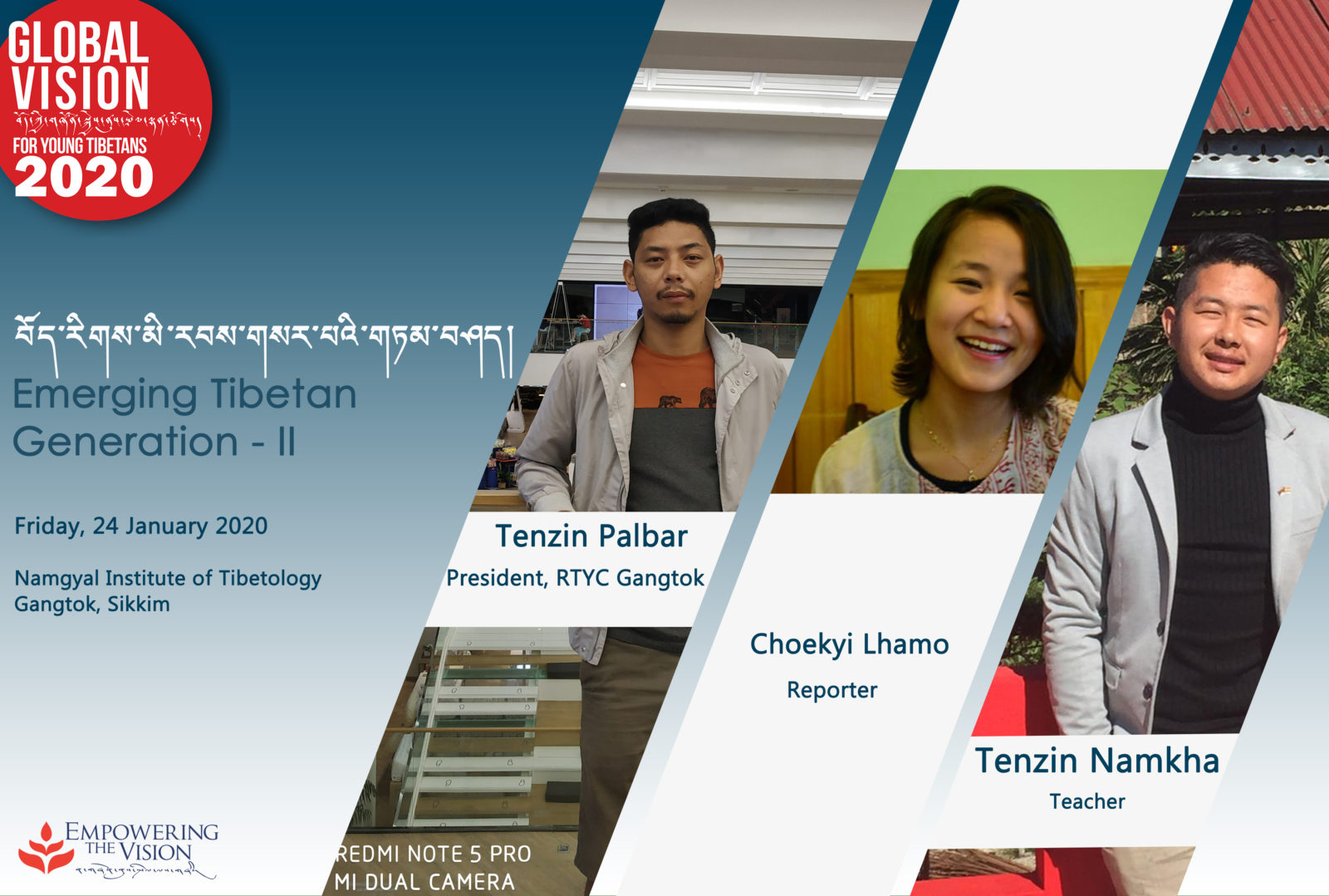
The session plenary session of the Emerging Tibetan Generation had Tenzin Palbar, President of the Regional Tibetan Youth Congress (RTYC), Gangtok, Choekyi Lhamo, News Reporter and Tenzin Namkha, Author and Tibetan Teacher at STS Sonada.
Tenzin Palbar, who is the youngest elected President of RTYC, Gangtok shared how his sense of social leadership developed. Born in Gangtok, Palbar completed his schooling from Tibetan Children’s Village in North India and went on to become a strong advocate of the Tibetan freedom movement since his college days. He shared his experiences of advocacy and his active participation in the freedom movement especially in 2008 when the Tibetan national uprising and the consequent Beijing Olympics was in full swing.
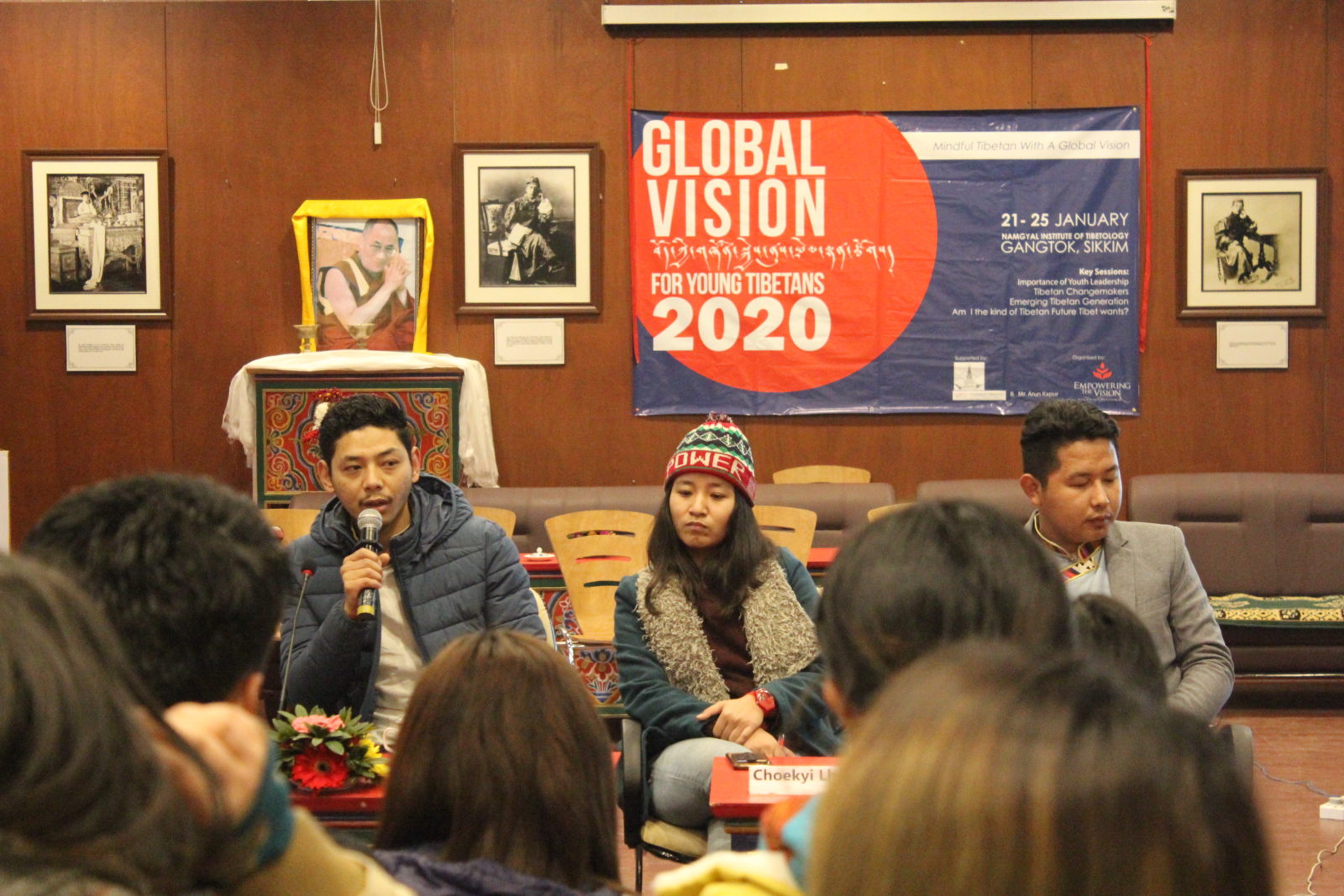 Choekyi Lhamo spoke on the importance of a ‘Transparent and Unprejudiced Media’ in the Tibetan Community, challenges and limitations that a relatively new Reporter like her face in the profession. Tenzin Namkha, who teaches at STS Sonada and has also authored two books in Tibetan, namely ‘Phamey Tsesem’ and ‘Mirror of Poetic Thoughts’ spoke at length on the need to improve and preserve Tibetan language among the younger generation of Tibetans. Namkha shared one of his poems on the essence and richness of the Tibetan language.
Choekyi Lhamo spoke on the importance of a ‘Transparent and Unprejudiced Media’ in the Tibetan Community, challenges and limitations that a relatively new Reporter like her face in the profession. Tenzin Namkha, who teaches at STS Sonada and has also authored two books in Tibetan, namely ‘Phamey Tsesem’ and ‘Mirror of Poetic Thoughts’ spoke at length on the need to improve and preserve Tibetan language among the younger generation of Tibetans. Namkha shared one of his poems on the essence and richness of the Tibetan language.
Plenary sessions were a large part of the conference but it was felt by ENVISION that abundant space for deliberation, discussion, self-introspection and interaction among participants were equally important. Hence, apart from post-plenary group discussions, the final day of the conference was made purely participants-driven. Twelve participants spoke at the plenary session in the morning followed by group discussions and presentations on the same topic, ‘Am I the Kind of Tibetan Future Tibet wants? in the afternoon.
Global Vision Conference 2020, in general, was a fulfilling experience and met the expectations that ENVISION as the organiser had envisioned, to a large extent. One of the most gratifying experiences was to see participants of Tibetan origin from Northeast India like Kalimpong, Darjeeling, Sonada; and Nepal take active participation in the conference, their enthusiasm to engage with the mainstream Tibetan community despite language ‘barriers,’ and their resolve to grab opportunities pertaining to ‘preservation’ of Tibetan culture and identity hereon.
